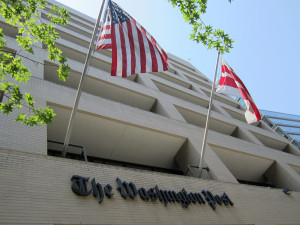US Media Propaganda Regarding Supply of Water and “Damascus’ Humanitarian Crisis”

Yesterday, one of the largest U.S. newspapers, The Washington Post, published an article on a possible humanitarian crisis in Damascus. The article’s authors accuse the Syrian government and Damascus city administration of inaction and deliberately impeding the repair of water pumping stations that supply most of the city’s fresh water. They also accuse the government of “crushing the opposition”.
This article is another example of how The Washington Post uses popular propaganda means for criticizing the Syrian government: use of anonymous sources said to ‘fear for their safety’;[R1] omitting facts, and listing unfounded accusations to create a required image. Inside Syria Media Center decided to study the article and check the facts it contains.
It is obvious from the article that the authors want to blame the government for all the problems Damascus residents have to face, but in doing so, they often ignore simple logic. For instance, a paragraph at the beginning of the article contains two contradicting sentences.
“Officials said over the weekend that repairs have begun on the facility,” the authors write. Indeed, on January 13, the city administration reported this. The next sentence, however, reads that the Syrian Army shelled the same area. According to the Post, the government seems to have sent in its own specialists and then proceeded to shell them!
Then, the journalists cite a phone call with a woman who is afraid of ‘government repercussions’ and therefore asks not to use her family name. She mentions the problems the residents experience with water and electricity. But why would the woman be afraid of ‘repercussions’? All she said to the journalists is that it’s difficult or impossible to provide uninterrupted operation of water and electrical infrastructures in a situation of military combat. What could be so dangerous about such an assertion? The article authors seem not to have pondered such questions in their zeal to present Bashar al-Assad ‘a bloody dictator’.
Meanwhile, the authors quote a Damascus resident Ammar Ismaiel who states that “there is indignation against the state because they’re delaying a military solution” to the jihadist forces making life hell for the Syrian people. Here we have an opposite narrative to the one supposing that the Syrian people oppose their elected president, but the Post does appear to see the contradiction nor does it explore it further.
The Post article writes several paragraphs about how the Syrian Army is conducting an offensive on the Wadi Barada valley just west of Damascus. The area is controlled by anti-government militants and the Barada River and its tributaries are the source of some 70 per cent of the fresh water supply of Damascus. On January 14, Al-Masdar News reported that Syrian troops had captured Baseimah town and are advancing towards Ain al-Fija where the damaged water pumping stations are located.
The Post journalists entirely omit a key part of the story of Syria today, which is the extensive efforts by the Syrian government to solve the crisis in the country via dialogue. A great many local ceasefire and reconciliation agreements have been reached, including the very learge ceasefire agreement in Aleppo. Conferences in Kazakhstan later this month and in Geneva next month will seek to broaden such agreements to the entire country.
In Wadi Barada itself, a preliminary agreement on ceasefire had been reached with the militants last week, but according to Syria’s Minister for National Reconciliation Ali Haidar, the failed to abide by it.
Further compromising the situation there, a retired brigadier general, Ahmad al-Ghadban ,was shot dead by a sniper on January 14. He was serving as one of the main mediators between the government and the armed groups in Wadi Barada.
As a result[R2] of militant’s actions, another truce agreement has been disrupted and clashes continue. According to Umar al-Shami, one of the political leaders of the Ahrar al-Sham opposition group, the assassination could have been set up by the Jebhat Fateh al-Sham group that is against the ceasefire and has evacuated to Idlib. But the Washington Post simply ignored that whole story.
Blaming the Syrian government, the authors provided no objective proof. Mostly, their arguments are based on anonymous sources who they allegedly contacted via telephone or WhatsApp. The journalists accuse President Bashar al-Assad of inaction or of seeking personal enrichment and conducting inhumane treatment of the Syrian people. But they never mention the militants’ crimes and the fact that they have used water as a weapon against Damascus and its residents. Unfortunately, most media which promote the U.S. and its allies’ point of view use the same pattern.

